22 Mar Forty years of the Ramones: ‘They were the smartest dumb band you ever heard’
‘Sid Vicious tried to play as fast as them’
Paul Cook, the Sex Pistols (drums)
Punk exploded into New York and the UK at exactly the same time. There were parallels: New York was bankrupt and London was a bombsite, with lots of strikes. British punk was more political, although the Ramones weren’t as dumb as everyone made out.
Ramones was the first so-called punk album. It made us think: “We’d better crack on here.” But the Ramones and the Pistols were different animals, with a different flavour. They were more basic, three-chord rock’n’roll. Great songs, really catchy, all two and a half minutes long.
Sid Vicious was a massive fan. He tried to imitate them with his playing, but they were a lot faster. At Dingwalls, there was a bit of: “Oh, they’re coming over here to our turf, jumping on our bandwagon.” I think they were taken aback by the reaction – things getting thrown all over the place. We were never in the same room at the same time. If we had been, the conversation would probably have been something like: “Hello, you’re shit. We’re better than you.” “No, you’re not.” “Yes, we are.”
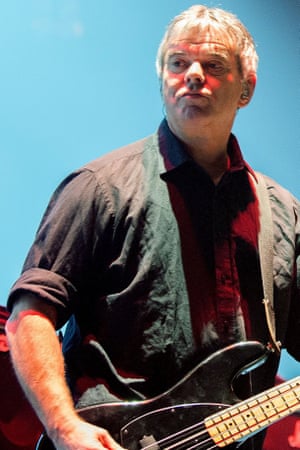
‘It was handbags at 10 paces’
Jean-Jacques Burnel, the Stranglers (bass, vocals)
We supported them in July 1976. We were bottom of the bill, next were the Ramones, and Flamin’ Groovies were top. We put a lot of people’s noses out of joint, being on that bill.
There was a punch-up outside Dingwalls between me and Paul Simonon [Clash bassist]. I didn’t drink in those days. After our set, someone gave me a glass of wine and it went to my head. We were all snaking out of the venue, which was rammed, and as I walked past Paul, he spat on the ground – a tough guy thing – so I punched him.
Suddenly all of us were out in the courtyard – the bouncers threw us out – and it was the Stranglers and the Finchley Boys against the Clash, the Pistols, the Ramones, Chrissie Hynde and various journalists. It was handbags at 10 paces.
Their album had just come out and it had a huge impact on the metal side of punk. A lot of British bands wanted to sound like that. Everyone sped up afterwards. The lyrics coming out of the pens of the British guys were a bit more agitprop, whereas the Ramones’ were funny. They looked like old hippies, in leather jackets, but they were honorary members of the punk elite, despite having long hair. Like Lemmy.
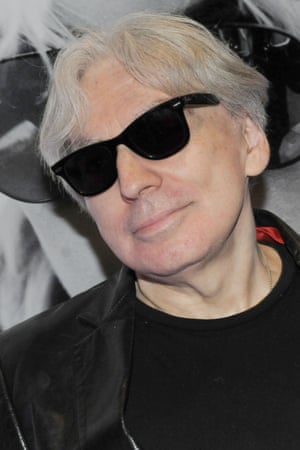
‘My daughters sing Now I Wanna Sniff Some Glue’
Chris Stein, Blondie (guitar)
Tommy, their drummer, approached me and said: “I heard you found this place to play – what’s the story? So we told them about CBGB. I like to think I was part of them winding up there.
We played with them there a lot in the mid-1970s. They were more focused than us, so we usually opened. It was never much of a crowd – maybe 100. I thought they were fantastic.
Everybody was sick of the Eagles and all those overblown, faceless bands like Chicago. Ramones took rock back to basics. They were very self-aware. Their album was a return to rock innocence, but very knowing. We felt more of an affinity with them than we did Talking Heads or the others. We liked Richard Hell and all the guys in Television, but there were two camps – the art crowd and the pop crowd. The Ramones and Blondie were more in the pop crowd.
I still play that album in my car. My daughters are 10 and 12 and they love it. They’ve been singing I Don’t Wanna Go Down to the Basement since they were five. Now I Wanna Sniff Some Glue? Yeah, they sing along to that, too.
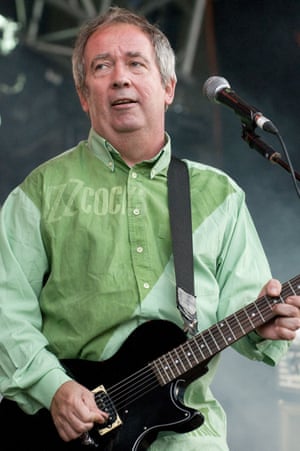
‘They had one idea and stuck with it’
Pete Shelley, Buzzcocks (vocals, guitar)
“As soon as we heard the album, we ordered two copies on import, and soon we were doing our own version of Judy Is a Punk. They were a fully realised concept, from the look, to standing in front of a brick wall for the album sleeve, all of it in black-and-white. It was an art piece.
The fact that everyone in the band had the same surname made it even more interesting. And the songs were really funny. It was good to know someone was getting away with playing fast, short songs with loads of guitar. I met them in 1982. They told me they’d been listening to Homosapien [Shelley’s 1981 single] on the tour bus. I remember getting very drunk backstage with them. They were always dressed in jeans and leather jackets. I never saw them in anything else. They had a single idea and stuck with it. If it ain’t broke, don’t fix it.
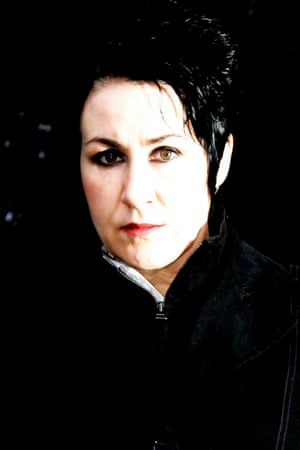
‘They certainly weren’t Status Quo’
Pauline Murray, Penetration (vocals)
Things would have been quite different if they had never existed. For a start, there wouldn’t have been the magazine Sniffin’ Glue. My boyfriend bought the album on import and we listened to it in his bedroom. It was the blueprint for punk: all barre chords, no solos, and no tracks over three minutes. The songs were fast, the drums were rattly, the bass plugged away on the root note, and the buzzsaw guitar was the sort that Buzzcocks and early Penetration would use.
The look tied it all together: leather jackets, T-shirts, ripped jeans, sneakers. They looked like normal kids on the street. They were cartoonish: they certainly weren’t Status Quo. The legs apart and the low-slung bass – we hadn’t seen that before. They had attitude. The Pistols were more arty than street. The Ramones were very American, like a dirty, east coast version of the Beach Boys.”

‘We even used tubular bells on the album’
Craig Leon, producer of Ramones
They were a return to streamlined, minimal rock with a strong pop element – they liked Herman’s Hermits and the Bay City Rollers as much as the Stooges. They were also very influenced by comic books and pop culture. Remember Superman and the Bizarro World – where everyone was the antithesis of their Earth-like counterparts? The Ramones were the Bizarro World Beatles.
They had an independent, devil-may-care attitude, but they weren’t anarchists like the Sex Pistols. They weren’t interested in revolution. If anything, they were politically conservative, more anti-hippie. They put references to Nazis in their songs just to antagonise people, even though half of them were Jewish.
People think the band just showed up in the studio, played, and then we had an album. But we actually rehearsed in January and began recording in February. We were trying to emulate their live sound, but also enhance it. It was more like the later Beatles albums where they started to use studio technology. On Ramones, there’s tubular bells, pipe organ, sound effects, guitar and drum overdubs, double-tracked vocals. They sounded primitive and raw, but we used sophisticated techniques to achieve that.”
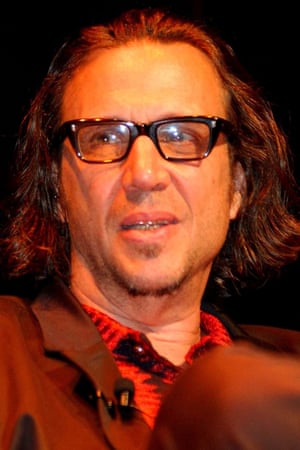
‘Dee Dee couldn’t play a C chord’
Richard Hell, Television, the Voidoids (bass, vocals)
Television needed a second guitarist so we advertised for a “narcissistic guitar player – talent not necessary”. Dee Dee Ramone was one of the people who showed up. He was cute and made an impression, but we needed someone who could play a C chord, so he didn’t make the cut.
I didn’t have any further contact with him until the Ramones started playing CBGB a couple of years later. They were really ramshackle. They only had five or six songs and were so broke they had to carry their guitars in laundry bags, and they’d get mixed up about what they were doing and start yelling at each other.
But they were already completely themselves. They were like The Three Stooges: always getting angry with each other, but in a funny way. They’d toss their guitars away in frustration or forget what song they were supposed to be playing. You had to love them. They were completely uncompromising.
The songs were irresistible, even if they were about sniffing glue. It was all calculated, but at the same time they were total clowns. Joey was really animated. You think of frontmen as these perfect specimens, but he was built like a preying mantis. He’d strike these dramatic poses like Iggy or a Mick Jagger, putting his hands on his hips, kicking his legs out, swinging the mic.
Tommy was the conceptualist. Dee Dee wrote outrageous, timeless compositions. Johnny came up with that driving, monotonous guitar. And Joey had the sweet voice and that whole mutant vibe. The album was a revelation. You could see in them a desire to be a really big group. Many of us believed that, because the music was so catchy, it would become the pop music of our era.
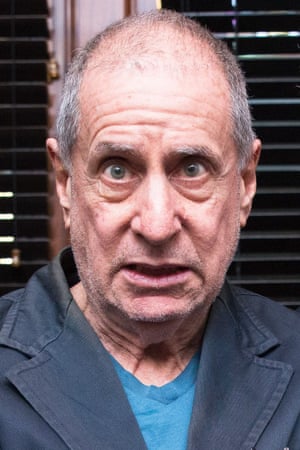
‘People had had enough of all that 1970s pretentiousness’
Danny Fields, manager
We’d never seen so many people as at those July 1976 shows. They were all there: the Sex Pistols, the Damned, Chrissie Hynde, Vic Goddard, Adam Ant, the Buzzcocks, the Stranglers – but we didn’t know who any of them were! They’d come over and say: “Hello, we’re in a band called the Clash!”
People had had enough of Deep Purple and Emerson, Lake and Palmer, all that 1970s pretentiousness. They wanted to know the secret of the Ramones’ fame. We told them: it wasn’t about virtuosity, it was about “just do it”. The band kickstarted the whole DIY, you-don’t-have-to-play-well ethos.
Also, coming from New York was seen as very exotic. It gave us a mystical glamour. Their look was very downtown: leather jacket, T-shirt, Levi’s, sneakers. People thought the Ramones were stupid, but they were dazzlingly smart.
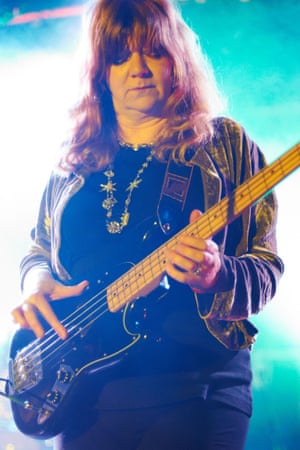
‘Those songs were fearless anthems’
Gina Birch (vocals, bass) and Ana Da Silva (vocals, guitar), the Raincoats
GB: I didn’t buy their record because I was living on no money in a squat at art school. But I heard the songs everywhere. They were funny, smart and sassy. The first song I wrote, No One’s Little Girl, was influenced by I Wanna Be Your Boyfriend. Their lyrics were so minimal yet pertinent. Punk was a time when it was OK not to have a boyfriend, to stomp the streets as a girl, fearless and full of life and creativity. Those songs were anthems.
Joey was the perfect frontman: gangly, vulnerable, cartoon-like. Much later I met Dee Dee when I was making a video for a solo project of his. He had an air of innocence, although I knew he’d taken lots of drugs. We felt he needed to be “looked after”, so we took him under our wing. It was very sweet hanging out with him.
ADS: I heard their debut album when it came out – I still have it, with its £2 price sticker. The sound was a big, loud wash and Joey’s vocals were almost deadpan. The songs were pure pop. The immediacy, simplicity and raucousness were like an injection of energy into those dull and oppressive times.
We were more inspired by the Slits, Subway Sect, Penetration, the Pistols and the Clash to start our own band. We saw them at local gigs and they seemed more approachable. But these bands were, in turn, influenced by Ramones. How many other people subsequently did photoshoots in front of a brick wall? How many T-shirts with their logo have been worn? And what about knee-splits in jeans?
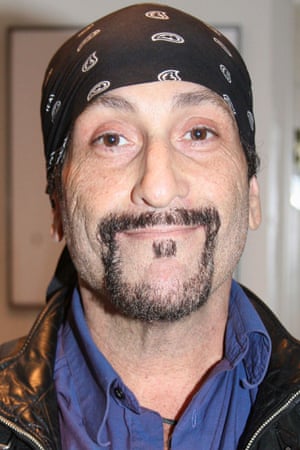
‘They were the smartest dumb band you ever heard’
Richard ‘Handsome Dick’ Manitoba, the Dictators (vocals)
There was a lot of respect between the Dictators and the Ramones. Joey and I were New York Jewish kids who loved rock’n’roll. He listened to girl groups, surf bands – everything. Then they added their own weird thing.
We cut our teeth in a club called the Coventry in Queens. We opened up for the New York Dolls there. We first saw Joey there, hanging out, but he wasn’t Joey Ramone back then – he was this 6ft 5in, hunched-over, 98lb guy going by the name of Jeff Starship from a glitter band called Sniper. Not long after, the Ramones formed, and we hit it off right away.
We were the first band from that scene to put out an album – The Dictators Go Girl Crazy! – a year before Ramones. We had that snotty, know-it-all attitude, this insane bunch of teenagers, thinking we were the coolest motherfuckers in the world. We were connected to the Ramones in the same way that the Yardbirds were to Led Zeppelin. We influenced each other. We had Master Race Rock, they had Blitzkrieg Bop. We wrote words that were outrageous and pushed the envelope but were dumb in a smart way, just like the Ramones. They were the smartest dumb band you ever heard.
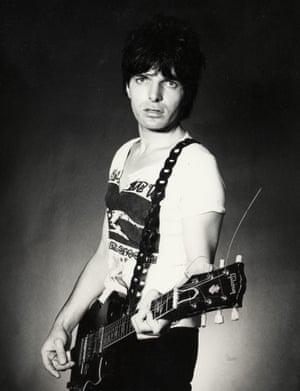
‘It was an assault on the senses’
Brian James, the Damned (songwriter, guitarist)
Those July 1976 Ramones gigs were mesmerising. People were either, “What the fuck is this?” or “Yeah!” They blasted out at 100mph through distorted Marshall amps. It was an assault on the senses.
We became mates and wrote them a letter: someone told me that letter is now in New York’s Hard Rock Cafe. Joey and Dee Dee were really nice blokes. Tommy was quiet. Johnny – I don’t like to speak ill of the dead – wasn’t particularly friendly.
We got a copy of their album early on. Me and Rat [Scabies, Damned drummer] listened to it after we’d drunk a few bottles of Collis Browne, a heavy, morphine-based cough medicine. We thought: “Fuck! This is good!”
They looked pretty cool on the sleeve, although I’d been wearing ripped-up jeans and a leather jacket since my days with the band Bastard. We played it to death. We’d been listening to Help! and wondered what it would sound like Ramones-style. That’s how our version of Help! became the B-side of New Rose. We thought it would be a nice finger up to the Beatles.

‘Joey used to do giant paintings of vegetables’
Tina Weymouth (bass) and Chris Frantz (drums) of Talking Heads
TW: They sounded better through a wall. Up close, the noise was too overwhelming for the brain. Dee Dee was one of the most consummate artists I ever met: he was the main songwriter, wrote 20 songs for every one by Joey, and he was the most fun to hang out with because he always had a lot of ideas, some of them outrageous.
One evening in Marseilles, our show got cancelled because the Ramones’ amps had drawn more power than had been alloted and half the town’s supply got blown. So Chris Frantz, Dee Dee and I came back to the hotel, where we had these packets of dry-cleaning spot remover. He poured the contents into a handkerchief and proceeded to sniff it like it was something delicious.
We were appalled. I said: “Don’t you know it’s destroying your brain cells?” He said: “I know, but I just gotta get high!” Joey was deeper. He used to do these giant paintings of vegetables. That’s when I realised they didn’t just stumble on their concepts – they were quite savvy about culture and art.
CF: Talking Heads toured the UK with the Ramones. I’d say, without hesitation, it’s up there with the greatest rock’n’roll tours of all time. I had to wipe down my drumkit after each gig because of the gobbing. I can remember looking from the side of the stage during their set and it was like a snowstorm – the British kids had these pints of lager and were spewing gob after gob on to the stage. We loved to watch the Ramones, but nobody wanted to follow them: the audience would be spent.
Touring was fun. I remember our tour manager, on the way from Bristol to Penzance, asking: “Would you like to stop and see Stonehenge?” And we said yes. But Johnny said: “I’m not getting off the bus. It’s just a bunch of old fuckin’ rocks!” Dee Dee said: “No, Johnny, I wanna see Stonehenge.” Talking Heads wanted to see it, too. But Johnny stayed on the bus.
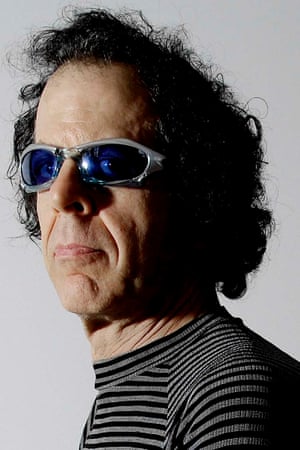
‘The politics were inside us all’
Martin Rev, Suicide (keyboards)
They were a little cleaner than us. Suicide were always quite scruffy: Alan Vega was using studs and cutting holes in his pants before it became a style, I was painting “Suicide” on the back of my jacket. It was a street look, very New York, 50s/60s gang-oriented.
We did gigs together, so they certainly knew our music. The Ramones were a little easier to digest. They didn’t have flying axes like we had. We were working-class kids from Brooklyn and the Bronx. The British groups may have been more consciously focused on politics, but the politics were inside us all.
My understanding is that Malcolm McLaren came to New York, saw the Ramones, and decided: “This is the future.”

